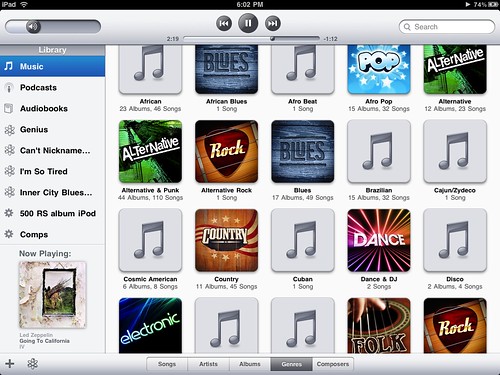From the folksonomy to your music collection
October 03, 2011 in genre by Dan Gravell

What happens when your music collection is missing some genres? A way of both completing and correcting all the genres in your music collection is to leverage the folksonomy; the collaborative categorisations of music available online.
But care is required: music will be categorised in different ways by different people, and filtering the possible genres down to a manageable set takes more effort.
Folksonomy is the result of personal free tagging of information and objects [...] for one's own retrieval. The tagging is done in a social environment [...]. The value in this external tagging is derived from people using their own vocabulary and adding explicit meaning, which may come from inferred understanding of the information/object.Thomas Vander Wal, Folksonomy
The term folksonomy has been around a few years now; it emerged with the rise of the Web 2.0 sites which encouraged a far greater collaboration between users than before. All of a sudden, objects represented on these websites could be tagged, and over time the collective tags would help describe the object.
Amongst these Web sites are the principle online music database sites. MusicBrainz and Discogs both allow tagging of genre against a given musical work, as does Wikipedia.
There is software, such as Picard and Jaikoz, that will download MusicBrainz's tagging for you. Unfortunately, a cursory glance at the tags MusicBrainz has to offer raises some worries.
Much of the concern comes down to the definition of genre. One of the biggest obstacles to accurate, complete genre tagging in a digital music collection is that, unlike most other metadata, it's so wooly. To most people there are clear genres - "Rock" and "Pop" for instance. To others genre includes the styles of music and moods the music evokes. The trouble with a folksonomy is that everyone's correct.
Of course, I say that in a tounge-in-cheek manner, as the very strengths of a folksonomy is the collective sum of all opinions. However, if you are trying to maintain a balanced, navigable music collection you don't want new and exotic genres being imported from anywhere. You want the genres that make sense to you.

If you don't care about the genres that categorise your music collection and simply want full coverage, then go ahead and import away! Personally, I prefer to filter these genres down into a defined set. It's this want of control that has inspired the genre classification rule in bliss.
There are a few things we can do to improve bliss's genre classification rule. First, we might be able to improve the number of matches against the MusicBrainz database by using an audio fingerprint of music. Further, the internal genre tree that bliss uses to correlate genres sourced online to the genres you actually want in your collection could be made more complete. This would improve the number of suggestions bliss makes. The goal must be: if a genre for an album is available online, but if that genre is not permitted according to your rule, there should be an alternative that can be found for it.
It's clear that the folksonomies on the major music information websites are a powerful tool for complete and accurate tagging. The question is how we make sense of that data and maintain a usable music collection. Stay tuned!
Thanks to jemsweb and swanksalot for the images above.

